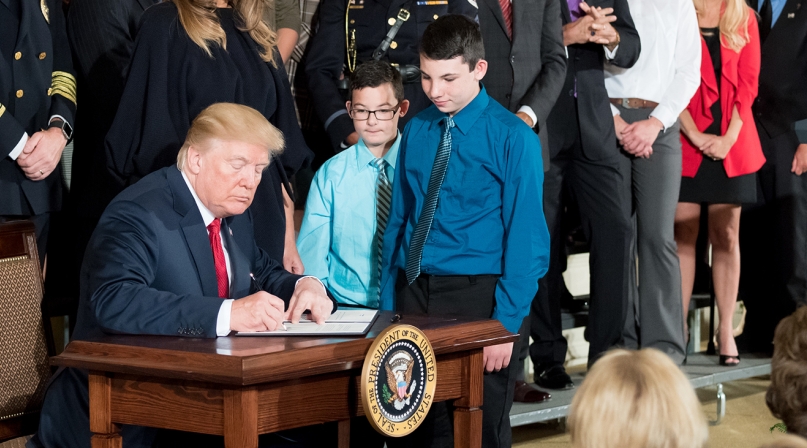Opioids declared public health emergency
Upcoming Events
Related News

President's public health emergency declaration on opioids allows HHS to waive administrative regulations around treatment resources and allows states flexibility in using federal funding to treat a crisis
The White House recently announced a series of next steps in the effort to address the nation’s rising tide of opioid overdoses and deaths. To respond to the crisis, President Trump on Oct. 26 directed the Acting U.S. Secretary of Health and Human Services (HHS) Eric Hargan to declare the opioid epidemic a public health emergency under the Public Health Service Act.
A week later, the White House Commission on Combating Drug Addiction and the Opioid Epidemic, chaired by New Jersey Gov. Chris Christie (R), released its final slate of policy recommendations, which are expected to be reviewed by Congress and the White House.
The first of these actions — the president’s announcement of a public health emergency — followed through on a recommendation offered by the opioid commission, but stopped short of committing new federal funds to the epidemic or declaring a national state of emergency under the Stafford Act.
Learn more
Public Health Emergency declaration
President's opioid commission report
Summary of opioid commission’s policy recommendations
There are important distinctions between a public health emergency and the wider national state of emergency, which many public health officials had expected the administration to declare. Public health emergencies are typically intended for short-term outbreaks and a focused deployment of federal officials and resources, whereas a national state of emergency under the Stafford Act would allow state and federal agencies to draw on the federal disaster aid fund and broaden public access to overdose antidotes.
A public health emergency declaration is nonetheless a significant step that enables the HHS secretary to waive certain administrative regulations around treatment resources and allow states greater flexibility in using federal dollars to combat a public health crisis. A public health emergency declaration lasts for 90 days and can be renewed by the HHS secretary. There are currently 13 localized public health emergencies in effect in response to recent hurricanes and the California wildfires.
The White House’s public health emergency declaration on opioids is expected to expedite the following actions:
- Allow patients to obtain medically-assisted treatment via telemedicine, which could make treatment more accessible for individuals in remote areas
- Provide state and federal agencies greater flexibility in hiring substance abuse specialists
- Shift federal funds dedicated to HIV programs to opioid addiction prevention efforts
- Expand eligibility for Department of Labor Dislocated Worker Grants to include people with opioid addiction; and
- Issue guidance on healthcare privacy laws that currently prevent medical providers from sharing medical information with the families of overdose victims.
In addition, HHS can tap into funds available through the congressionally-established Public Health Emergency Fund. The fund’s reserves currently total approximately $57,000. The White House has indicated that it plans to negotiate with congressional lawmakers to include funding for opioid abuse prevention in a year-end spending package.
How Congress uses the commission’s recommendations remains to be seen, especially since many of the proposals would require new streams of federal funds. Congress previously allocated funds to address substance abuse in last year’s 21st Century Cures Act; so far, $500 million has been appropriated and the balance is expected to be attached to FY2018 funding for the federal government. Other grants to address the crisis were outlined as part of the Comprehensive Addiction and Recovery Act of 2016, which was signed into law with NACo’s support.
Many public health advocates worry, however, that the combined costs of overdose antidote drugs and addiction treatment programs, among other costs, could go far beyond what has been allocated to address the crisis thus far.
Opioid Commission’s Policy Recommendations
Congressional lawmakers are expected to review the opioid commission’s third and final report of policy recommendations. The commission specifically calls on Congress and the White House to take the following steps:
- Establish education requirements for opioid-prescribing medical professionals
- Create substance abuse aid block grants to disburse to cities and states struggling to manage the cost of the epidemic
- Expand federal drug courts into all 93 federal court jurisdictions
- Enact harsher penalties for the trafficking of fentanyl, a synthetic opioid that can be up to 50-100 times more potent than prescription versions of the drug
- Adjust the way insurance rates are calculated to encourage opioid-prescribing medical professionals to recommend treatments other than painkillers to patients, and
- Call on the Centers for Medicare and Medicaid Services (CMS) to remove pain-related questions from patient satisfaction surveys, which may contribute to overprescribing of opioid pain medication.
Attachments
Related News

County Countdown – Dec. 15, 2025
Every other week, NACo's County Countdown reviews top federal policy advocacy items with an eye towards counties and the intergovernmental partnership.
Stretching small opioid settlement allocations helps funding do more
States and localities are set to receive $56 billion in opioid settlement dollars over an 18-year period, but not every county that receives settlement funding will get enough to build out infrastructure.